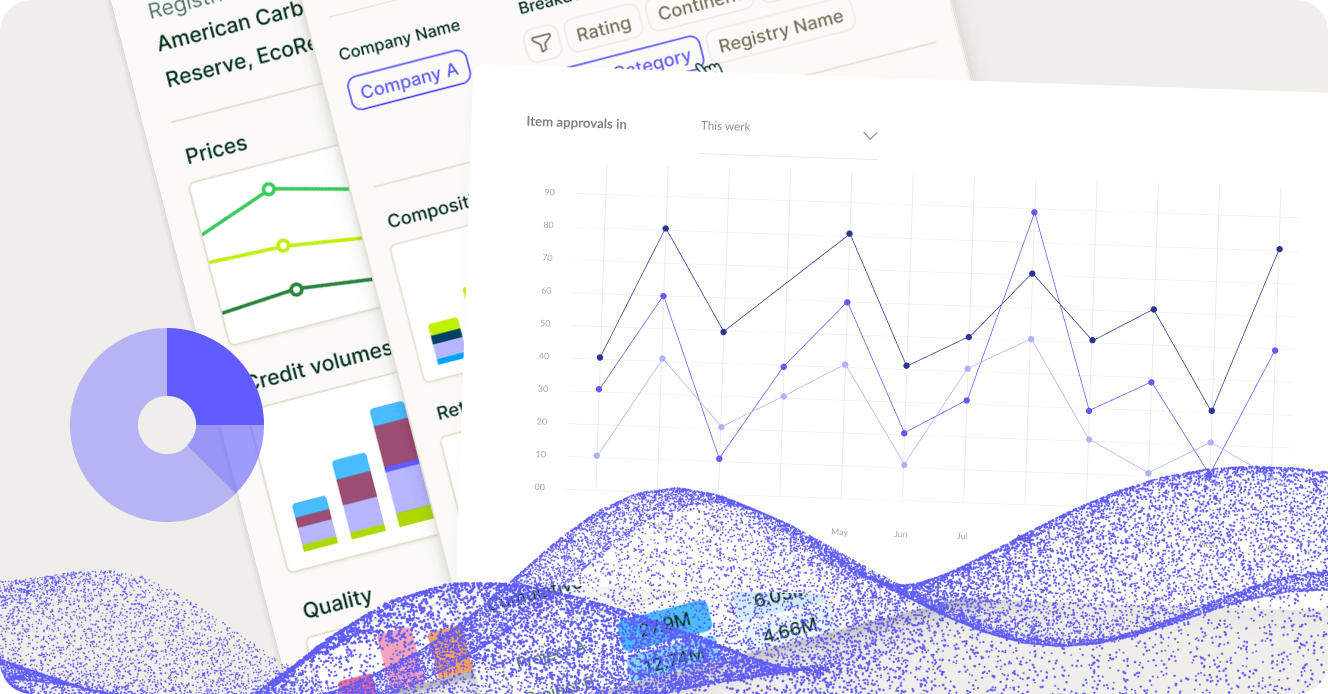“Over the years we’ve invested significantly in our field data team - focusing on producing trusted ratings. While this ensures the accuracy of our Ratings, it doesn’t allow the scale across the thousands of projects that buyers are considering.”
For more information on carbon credit procurement trends, read our "Key Takeaways for 2025" article. We share five, data-backed tips to improve your procurement strategy.

One more thing: Connect to Supply customers also get access to the rest of Sylvera's tools. That means you can easily see project ratings and evaluate an individual project's strengths, procure quality carbon credits, and even monitor project activity (particularly if you’ve invested at the pre-issuance stage.)
Book a free demo of Sylvera to see our platform's procurement and reporting features in action.
A lot has changed in the last 12 months, and not all of it was as negative as some reporting would suggest! Although this year surfaced criticism and doubt in the market, we saw real traction in developing areas of the VCM for greater investment and improved quality, in areas such as early-stage or “pre-issuance” projects, jurisdictional approaches, and carbon dioxide removal (CDR) activities. Picking up on some of these key themes also gives an indication of what we can expect in 2024 and how buyers, investors, and those thinking about entering the VCM should be preparing for the next 12 months.
.avif)
Key themes from 2023
As is apparent from this timeline, it’s been a busy year of news. So what’s been the effect on the market? Here we discuss four key trends, and how they will carry into next year.
Industry self-regulation
2023 recap
With the integrity of VCMs coming under increasing scrutiny, this year saw major progress from industry initiatives seeking to address issues on both the supply- and demand side of the market. Setting a threshold for credit quality, the ICVCM published its Core Carbon Principles for both programs and credit categories. The market has already begun to react to the ICVCM’s guidance, such as Verra revising its VCS Programme to ensure compatibility. Meanwhile, the ICVCM is working hard to define credit categories and assess them against its framework, with the help of advisory groups which are currently being assembled.
The VCMI’s Claims Code of Practice outlined how credit buyers should be using credits alongside science-based net zero targets such as from the SBTi. The SBTi progressed its own work on guidance for carbon credit usage by conducting market consultation on BVCM (beyond value chain mitigation). We hope for full BVCM guidance by the end of this year. It is not yet clear if these approaches will provide meaningful incentives for engagement with carbon markets.
However, for companies seeking clarity on how to engage with VCMs, these pieces of guidance are broadly compatible. Recent guidance from the World Economic Forum provides a clear playbook for how corporations can best navigate this ecosystem to maximize commercial and climate impact.
Forward look
As the ICVCM starts to approve and exclude programs and categories, market demand will shift, impacting both prices and upstream project development. Full implementation will take some time, but as the market seeks certainty, programs, and categories that are approved quickly are expected to see a boost in demand.
The SBTi has become a leading voice in the space, and its BVCM guidance has the potential to boost confidence and stimulate demand. However, in its consultations so far, it has strongly signaled that it is unlikely to introduce any big changes, such as mandating BVCM or validating claims. On balance, the new guidance is not expected to have a significant effect on the market in the short term.
Regulation
2023 recap
Regulators in many jurisdictions are also showing increasing interest in VCMs and integrity. One leading the way is the US financial regulator, the CFTC, which held a public convening on VCMs and put out a call for whistleblowers on carbon market misconduct.
This year has seen a focus on increasing transparency through climate-related disclosure regimes expanding to include requirements to report on carbon credit use. Most notably, this includes new ISSB Standards, which have been incorporated into CDP reporting and which countries like Singapore are considering adopting, and new rules have also been proposed in the EU and US (both nationally through the SEC and in California).
Many jurisdictions are also cracking down on corporate sustainability claims, such as carbon neutral. There has been a lot of coverage of proposed legislation in the EU seeking to ban or limit carbon neutral claims, as well as (much softer) updates to advertising guidance in the US and UK.
Forward look
Direct regulation of VCMs might still be a while off, but regulators are now taking steps in that direction. One area to watch is the UK, where the government is preparing to launch a consultation on VCMs and potentially endorsing or adopting self-regulatory standards, on the recommendation of the Skidmore Review.
In the US, a revised disclosure rule from the SEC is expected imminently. While this is likely to be less comprehensive than initially proposed, it will nonetheless hugely progress climate-related reporting in the world’s biggest economy.
Article 6
2023 recap
Under Article 6.2, a number of countries have continued to sign bilateral agreements, and 63 pilot projects have been agreed. We also saw the first authorization of a transfer of credits under the mechanism between Ghana and Switzerland in late 2022. As agreed at COP27, going forward, countries need to submit Initial Reports in which they detail their plans for cooperation before transactions can take place. Ghana and Switzerland are the only countries to have done so to date, but we expect many more in 2024.
Article 6.4 has not yet been implemented, as parties negotiate the exact terms of the mechanism, including what kind of activities are eligible. Discussions this year, including at the Bonn Intersessional, have been slow-moving. Recent talks hoped to agree a position on removals and on approved methodologies, and although consensus was not reached the chair of the supervisory body announced a ‘quantum leap’ in the discussions (in terms of the depth and detail of the discussions, if not the extent of their consensus).
Forward look
A number of countries who have already signed agreements are expected to submit Initial Reports and progress their Article 6.2 cooperation in the coming year.
Following the recent breakthrough in discussions, there is hope for good progress on Article 6.4 implementation at COP28. Key issues include approved methodologies, removals, activity cycle procedure and validation and verification. However, the current expectation is that Article 6.4 is unlikely to be implemented before 2025.
Market Convergence
2023 recap
VCMs were only ever intended to be a stop-gap while compliance mechanisms for carbon pricing were developed. While this has taken a lot longer than hoped, the convergence between voluntary and compliance markets is a long-term trend that is expected to continue. Already, a number of compliance carbon pricing schemes accept limited use of voluntary credits, including in Mexico, California, Australia, Korea, and South Africa.
The rules and norms developed under Article 6 also have an impact on the VCM. One key issue is corresponding adjustments (CAs). There are several live debates, such as when and if CAs will be required in VCMs, and how credits without CAs can be used. This is also driving a spate of regulation in host countries, including Indonesia and Zimbabwe, as they seek to gain more control over carbon projects and emissions reductions that could contribute towards their Paris Agreement targets.
Forward look
In 2024, more countries are expected to introduce compliance schemes that allow the use of carbon credits, such as Singapore’s carbon tax.
A particular area of interest is the potential for compliance markets to drive considerable demand for carbon dioxide removals. The UK and EU Emissions Trading Schemes (ETSs) currently do not allow the use of any voluntary credits. However, there is an expectation that both may allow limited use of removals in the near future: in the EU, a report is expected on this in 2026, and recent UK consultations have raised the issue. The EU ETS is currently due to result in net negative emissions by 2045 thanks to removals.
Upcoming highlights
In the next few months, here are a few key events to watch out for:
- COP28
Held from 30 November to 12 December in Dubai, COP is a highlight on the climate calendar each year. Watch out for our upcoming blog on what to expect and ongoing coverage from our team, who will be on the ground following all the developments.
- US
In March 2022 the SEC (Securities and Exchange Commission), a key financial regulator, published a draft rule on climate-related financial disclosures. We have been waiting for the finalized version for several months and now expect it in early 2024. The bill is likely to be watered down from the original proposal, with scope 3 reporting requirements, particularly contentious, but will still have a significant impact on transparency across the sustainability landscape. For a deep dive into disclosures, check out our blog here.
- UK
The UK government had been due to publish a consultation on VCM regulation and policy support in response to the Skidmore Net Zero Review by the end of the year - this is now expected either in December or, more likely, in early 2024. It will be a good indicator of UK policy priorities for VCMs and the scale of ambition.
- EU
A number of initiatives that could directly affect VCMs are currently passing through the legislature. This includes the Empowering Consumers Directive and the related Green Claims Directive. The new Corporate Sustainability Reporting Directive - the EU’s updated disclosure rule, comes into force on 1 January 2024. All these rules will affect not only EU-based companies but also large companies operating in the region.
Stay up to date on our commentary and key highlights from COP28 here.















